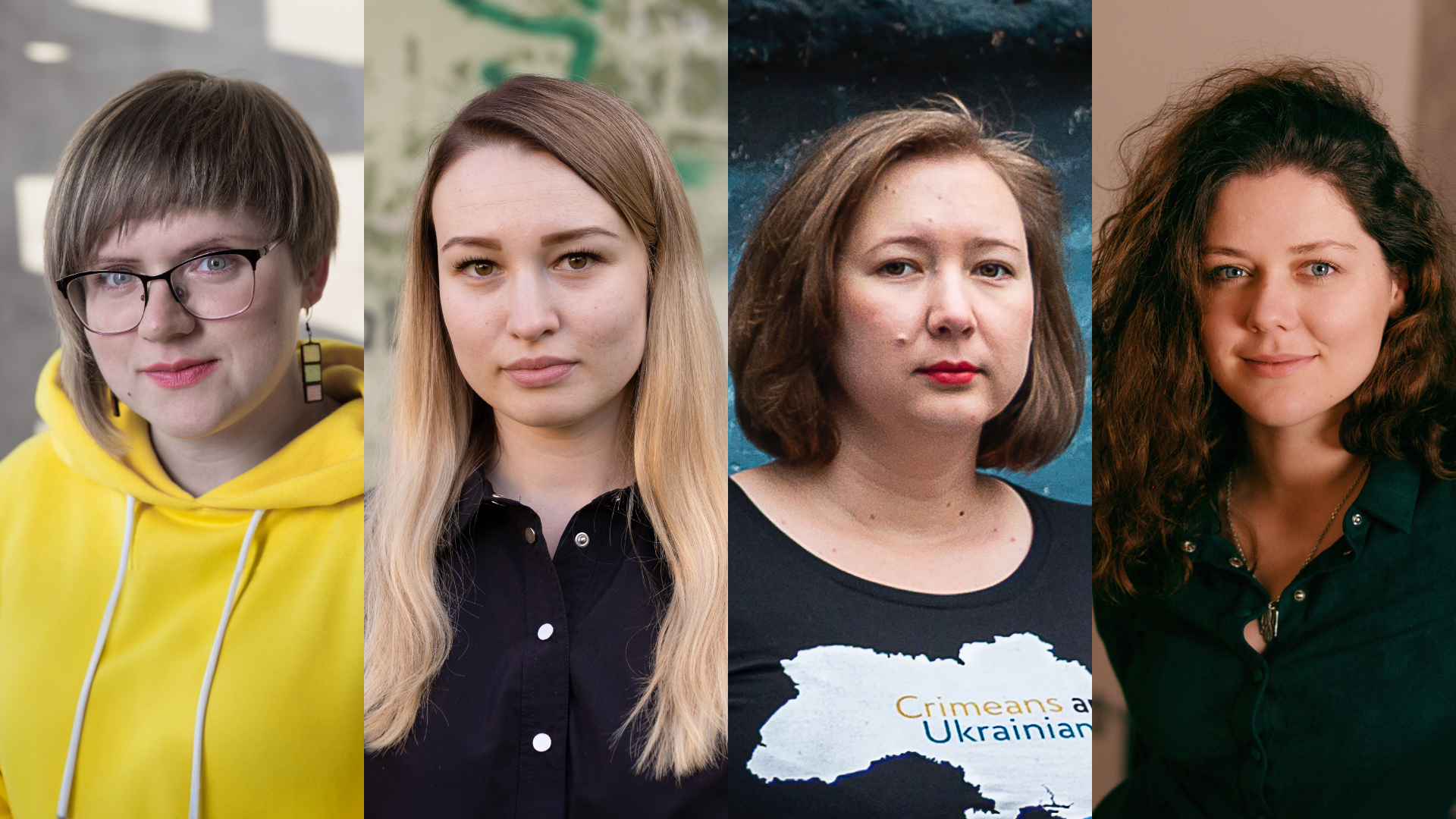About the interviewees (Left to right in the top photo)
Alena Lunova is the Advocacy Director at the Human Rights Centre ZMINA.
Kateryna Petrova is the acting Head of the Regional Center for Human Rights.
Olha Skrypnyk is Chair of the Board at the Crimean Human Rights Group.
Mariia Sulialina is the Head of the Center for Civic Education Almenda.
All four organisations are members of Human Rights House Crimea, Crimean Platform Expert Network and Ukraine 5AM Coalition. Since the beginning of the Russian occupation of Crimea in 2014, they have been active in monitoring and documenting human rights and international humanitarian law violations, supporting Crimean civil society, and advocating on national and international levels.
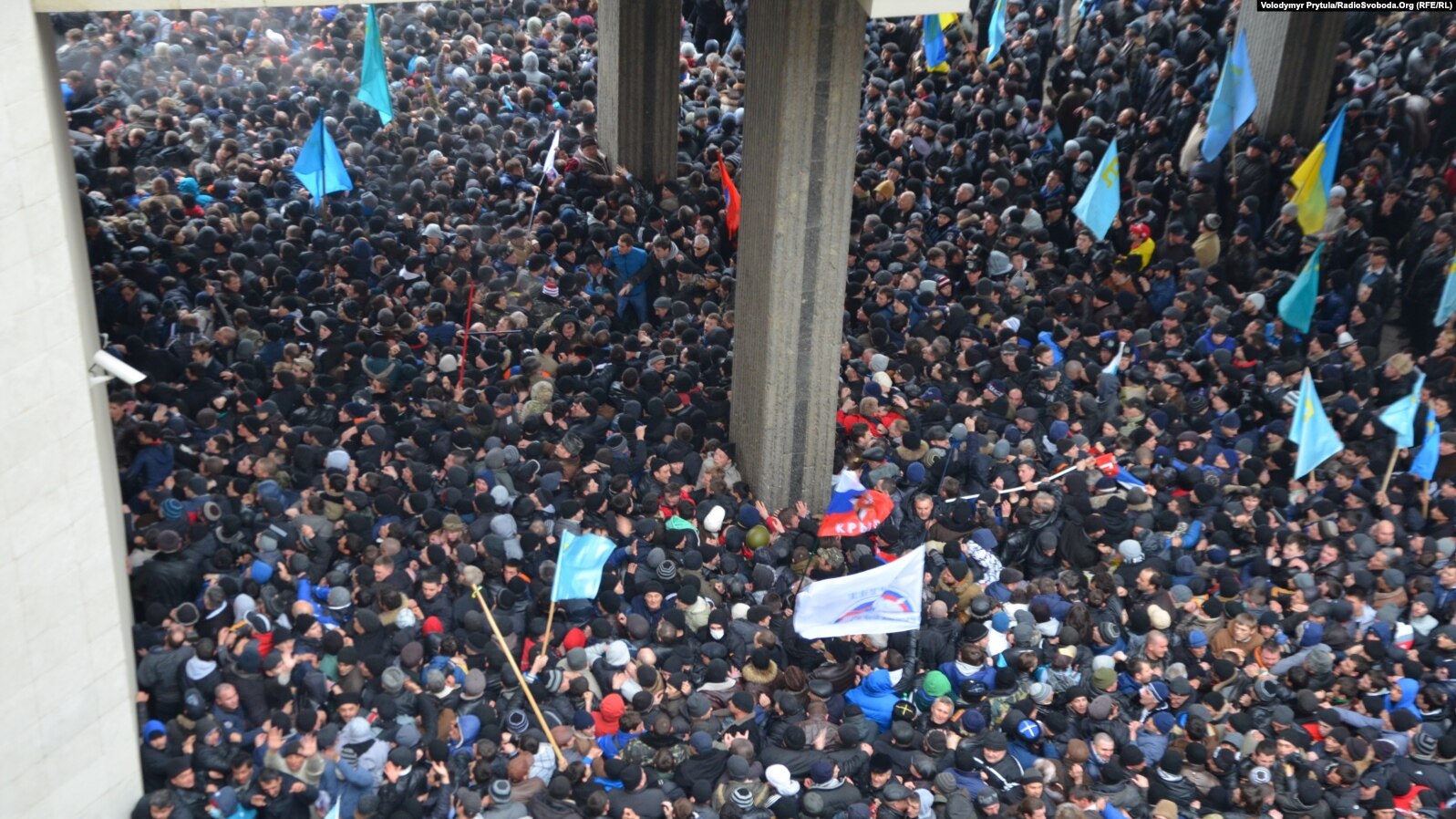
How would you summarise the developments related to the human rights situation in Crimea over the past 10 years?
Olha Skrypnyk (OS): Over the last 10 years, the Russian Federation has established a repressive machine in Crimea, aimed at politically motivated persecution, the destruction of independent media – which now can only operate underground, and the total militarisation of consciousness – including the most aggressive among children. Since the start of the full-scale invasion of Ukraine, this situation has only deteriorated.
And, finally, perhaps the most vivid confirmation is [that Crimea is] one of the key [Russian] military bases today – not just a military base but specifically for attacks on the civilian population. We see that attacks on civilian objects are being launched from the territory of Crimea, despite the protected status under international humanitarian law. This is a platform for full-scale aggression, the quintessence of what a totalitarian regime can do in a very short time in the absence of an appropriate international response.
Mariia Sulialina (MS): Unfortunately, over the last decade, the human rights situation in Crimea has been getting worse every year. Looking at the issues that we work on, in particular, crimes against children, the identity destruction, there has been a cumulative effect at play. If we talk about certain trends, then the full-scale invasion, of course, drew more attention to what has been happening in Crimea for all these years.
Statement on the 10th Anniversary of Crimea’s Resistance to Russian Occupation
Read the joint statement of Human Rights House Crimea, its member organisations and HRHF: “As we mark a decade of resistance in Crimea, we reiterate our calls for accountability, the release of all political prisoners, and an end to gross and systematic human rights violations. We stand in solidarity with the people of Crimea, committed to continuing our efforts to restore their rights and freedoms.”
Has the international community’s perception of the situation in Crimea changed over the last decade? What is the current perception?
Alena Luneva (AL): It’s regrettable that we’ve been discussing the occupation of Crimea for a decade now. However, now more than ever, thanks to the creation of the Crimea Platform and following the onset of the full-scale invasion, we’re talking more about the necessity of returning Crimea.
This is not only within the context of our state’s interests but also as a serious matter for ensuring the security of the Black Sea region and many countries overall. It seems to me that for a long time, despite all of us saying that militarisation is happening at a rapid pace, our partners [in the international community] had a very weak understanding of where this was heading, and what the consequences could be, and now we are seeing the consequences – how Crimea, being heavily militarised by the Russian Federation, affects the course of the war.
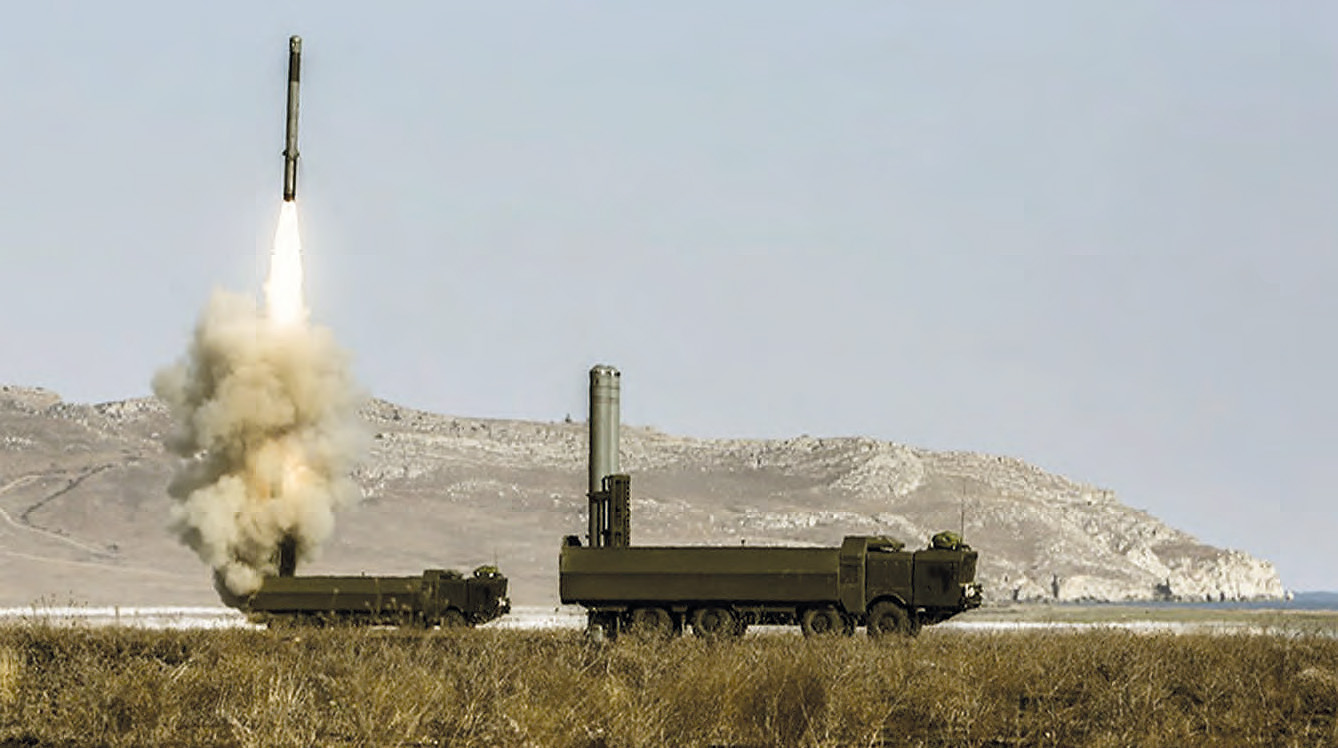
Kateryna Petrova (KP): Starting in 2022, attention [to the situation in Crimea] has increased significantly, and the international community began drawing parallels with what was happening in the newly occupied territories. Many of those who were previously in doubt, suggesting that occupation of Crimea was not necessarily bad, that the population might have wanted this, they began drawing parallels…realising that [the occupation happens] not because someone speaks a certain language, or someone there wanted it, or for any other reason. It happens simply because the occupying state wants to and feels the power to do it and feels impunity for what it can do.
It seems to me that this attention is again fading now. I don’t believe in ‘Ukraine fatigue’, but I do believe many are tired of very difficult events and the fact that you really have to pay a significant price to change something. Everyone is tired of the responsibility placed on them… And now the only question is whether they will be willing to see this through to the end.
Kateryna Petrova
OS: In 2014 and subsequent years, there was critical inadequacy of attention and understanding of what was happening in Crimea, which was perceived very remotely from larger geopolitical events, although Crimea had significant regional importance, at the very least for the Black Sea region, if not wider. As we see today, [what happens in] Crimea affects global processes.
From 2014, Crimea was not yet considered to be part of a war, although it was the beginning. In 2022, the understanding among the international community of the significance of Crimea for Putin changed – it became clear to everyone that Russia was preparing for a full-scale invasion, and actually, through Crimea, it was clearly visible.
Olha Skrypnyk
What human rights work is still possible in Crimea?
OS: Fundamentally, the essence of the activity remains unchanged – it’s about defending human rights, collecting evidence of crimes. Almost everything that was done in 2014 may be considered possible but now there are more threatening conditions. Back then, for such [human rights] activity, it could have been an administrative case or an intimidating conversation with the FSB, now it’s most certainly a criminal case with terrifying sentences of 10, 12, or more years [in prison].
Despite all this risk and horror happening around us, I see that even more motivated people have emerged. I think there are two reasons for this: firstly, it’s inherent in Ukrainian society not to give up. Secondly, for many residents of Crimea today, there is an absolutely real chance, which they didn’t see before, it’s the chance of Crimea’s return. So this gives them hope, it gives them strength, it gives them motivation.
When they [Russian authorities] adopted changes to the administrative and criminal codes back in March 2022, including articles related to the discredition of the Russian military – these were already mechanisms, instruments of persecuting people for any disagreement and any resistance. The ‘confiscation of property’ law, signed recently, is an upgrade and refining of existing instruments.
Russia realises very well now that there is no more “Kyiv in three days” and so they adopt a corresponding military budget. Hence, they need to have certain economic instruments, to continue plundering the Russian population. I expect new economic instruments to appear to seize property, any resources from people because those existing resources are not unlimited, even in Russia. So, this is standard Soviet style totalitarian practice.
Olha Skrypnyk
AL: There are certain things that are done but should not be discussed publicly due to safety concerns. However, it is very important for us to support and to do everything possible to make people who remain in Crimea feel supported as they help, advocate and protect citizens of Ukraine persecuted for political reasons in Crimea.
As someone originally from Crimea, what are your motivations to be involved in and continue the human rights work?
![“When we are free, we turn into people who only need a beautiful sunset to be happy.” - In the photo it’s the preserved, pre-occupation sample of me [overlooking homecity Yalta],” shared Sulialina on her Facebook.](https://humanrightshouse.org/wp-content/uploads/2024/02/crimea-3.jpeg)
I was 18 years old when we were protesting against the occupation of Crimea. When we had to flee… I couldn’t let go. You had your safe life, you had plans… and then suddenly there was a great injustice that you couldn’t influence, but you really wanted to. And probably all these years [of work] have been an attempt to correct this injustice.
Mariia Sulialina
MS: I clearly understand that [my situation] is much safer from the point of view that I left [occupied Crimea]. I can speak out freely, be public, I can talk about what is happening [in Crimea], but many of those who have remained in the occupation and we keep in touch with. They cannot speak for themselves, so someone has to speak for them. Someone has to demand justice.
I’ve been involved in human rights work and activism long before [the annexation of Crimea] and what motivates me to keep going many years after is the prospect of returning home.
Alena Lunova
AL: That’s exactly why, in my work I focus on the topic of transitional justice essentially involving transitioning from a state of war to a state of peace with a process based on a people-centric approach and the corresponding state strategy and international advocacy.
Read the stories of Alena Luneva and other human rights defenders from Crimea in Crimean Album: Stories of Human Rights Defenders.
OS: Crimea is my home, I will definitely return there after de-occupation. My involvement in human rights probably began back in my school years when I didn’t even know what it meant. I think my primary influence was my mother, Svitlana, who worked at the ambulance station, and I saw what it meant to unconditionally help people. You don’t need to know who that person is, you just have to help. And this, probably, is an attitude towards human dignity, which is truly at the core of human rights values. My husband, Vissarion Aseev, experience is also inspiring for me – his direct involvement in human rights protection and the fight against Russian government violence and terrorism in North Ossetia, including the Beslan tragedy.
What keeps you going is the people you help, and those who help you. The people who trust us – the families of political prisoners, the political prisoners themselves, the people who help us collect evidence on the ground in Crimea, often risking their freedom and lives. Probably the most emotional moments that have given so much charge were the returns of our [citizens from Russian captivity]. Especially in September 2019, when five political prisoners [related to Crimea] were returned [to Ukraine as part of prisoner exchange], including those who we directly supported and did everything for their release… For our team it was extremely emotional to see their plane landing in Boryspil [Kyiv airport], to see in real life those you were fighting for and doing everything for their return for many years before that moment.
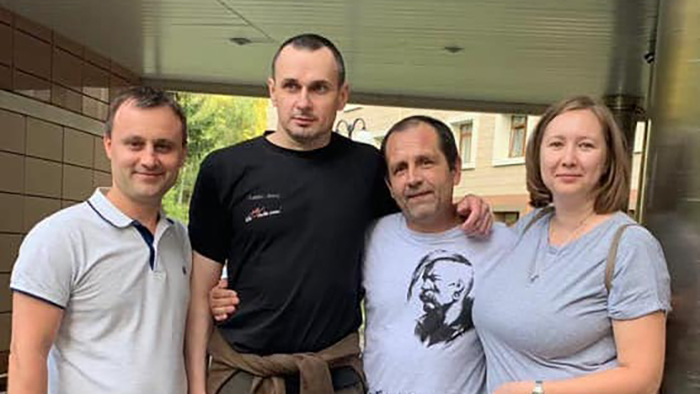
KP: In five and a half years, I’ve come a long way within the work in my organisation – from junior lawyer to acting Head, and of course, in particular, because of my personal attachment to Crimea, I burned out several times… And, as my function is mostly managerial now, my motivation is that I should do my job well. To support my colleagues, who are great experts, they should be able to rely on me and do what is needed. But, оf course, we all have hopes and probably even dreams that we will return home to Crimea. I am certain that Ukraine will endure. How soon will it be the way we envision it now, with the occupied territories liberated? I don’t know.
Our organisation was founded in Sevastopol before the occupation and over these 10 years, we have been through a lot and adapting to the new challenges, but we aspire to return to Crimea – it’s even outlined in our mission. You know, nothing can stop us now. We will continue to adapt and work forward.
Kateryna Petrova
What have been the most significant challenges and lessons learnt in addressing the human rights situation in Crimea?
MS: From the perspective of interacting with the international community, unfortunately, even after 10 years, we often encounter the need to re-explain that the annexation [of Crimea] was illegal, that Crimea is Ukrainian territory, and that there was and still is resistance to the occupation in Crimea. Moreover, sometimes it’s necessary to explain that Ukraine is an independent state, even if Russian propaganda claims that Ukraine does not exist as a separate country, and that Crimea is not historically a part of Russia, because the periods when Crimea was part of the tsar or Soviet Russia are very brief in the overall span of Crimea’s history and the fact of its being settled by various peoples and becoming part of different entities throughout human history… Another quite painful issue, especially over the last year, is the attempt to use Crimea as a bargaining chip – attempts of testing the readiness of Ukrainian society to give up Crimea and to generally test where Ukraine is ready to make territorial concessions.
[For Crimean children] 10 years of occupation is a long time. For some of them, it’s their whole life. It is a time when children are constantly being persuaded that they are Russians, [and they] are being prepared for military service. We’re talking about every child in Crimea now. Essentially, the Russian Federation has taken away their childhood. A Ukrainian child who would have been eight at the time of the annexation is now of mobilisation age in Russia.
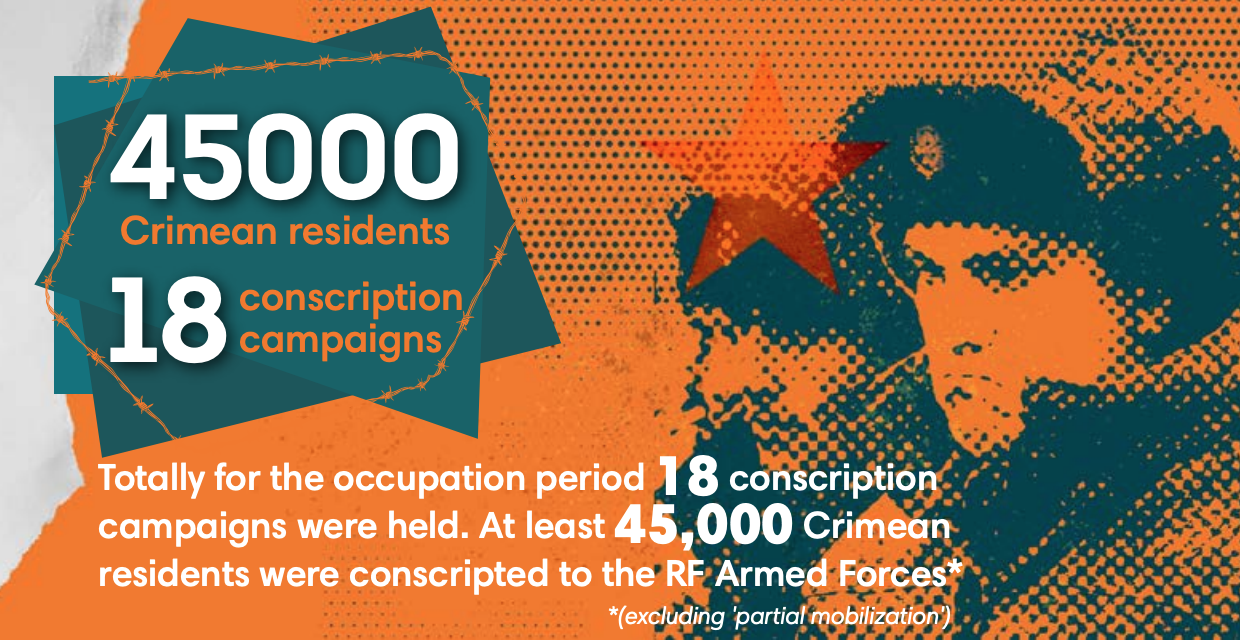
AL: Russia aims to break civil ties. Russia took advantage of the onset of the COVID-19 pandemic and closed the administrative border, effectively sealing off Crimea and disconnecting them from the rest of Ukraine. This also significantly worsened the situation regarding [monitoring and documentation].
The atmosphere of fear and danger created by the Russian Federation, attempting to hinder monitoring of human rights violations in Crimea, had already been present, but it worsened even more after the full-scale invasion…
Alena Lunova
Now, Ukrainians can only enter the occupied territories, including Crimea, through Sheremetyevo airport and FSB checks, where people are kept in humiliating conditions, waiting for days and selectively being denied entry, including to dying relatives.
OS: Central to our work are people and the protection of these people, and the question of how to save them is always a challenge for us. Therefore, one of our key directions has become a work with political prisoners – people who have not committed any crime and we are still trying to do everything to bring them back. But there are literally only three examples of exchanges when Crimean political prisoners were returned, and since 2022, not a single Crimean was released as part of the exchanges. If Crimeans return – it’s only after they have already served their illegal sentences.
After February 2022, all organisations in Ukraine, including ours, have been facing another new challenge. It’s the challenge of physically surviving, and it’s a difficult experience, I don’t wish it on anyone. Most of the organisations of the civil society remained in Ukraine, despite all the risks – and this says about our resistance.
Olha Skrypnyk
KP: One of the challenges we face relates to the qualification of the crimes of the Russian Federation – for example, in this case, as genocide. The complexity lies in the fact that many partners are not ready to work on this topic, although we consider it important. In 2022, we submitted a communication to the International Criminal Court regarding the deportation of children. We submitted it as genocide. Eventually, the International Criminal Court issued an arrest warrant, but classified it as a war crime.
The topic of genocide faded away and we felt this. And international organisations and the governments of other countries are much more willing to listen to what we have to say when we are not talking about genocide, and it was very difficult for us – an ethical moral dilemma – what are you willing to sacrifice to achieve something? Are you willing to hide what you really think and in order to be listened to at all? Well, in the end, we made a choice – to compromise with conscience and reduce the use of this term. This word was like Voldemort, which really scared everyone.
Kateryna Petrova
Can you share some examples of successes or positive changes that have been achieved through your organisation’s efforts?
OS: One of the achievements of the human rights community is that the people-centred, integration-oriented approach has become central [for the state strategies on temporarily occupied territories]. That is, for Ukraine, the return of people became the most important priority. The territories are important, but first and foremost, we need people. I remember how in the first years of occupation, everyone talked about territories, but territories will never matter if there are no people there.
Since 2015, we have raised the issue of militarisation specifically in the humanitarian dimension, not in terms of military bases, but in terms of the militarisation of people’s consciousness, especially children. And here, I think, an important achievement was that the problem of militarisation was recognised, including at the UN level – a separate resolution on the militarisation of the Black and Azov Seas, which precisely included the issue of militarisation of children, and illegal conscription into the armed forces of Russia. And indeed, we proved this at the level of the prosecutor of the International Criminal Court, because it was confirmed that this phenomenon indeed should be investigated by the International Criminal Court.
Read more: Olha Skrypnyk on HRDs recommendations for the recent UN resolution on Crimea
KP: We have become stronger – I mean the civil society, the state institutions of Ukraine. Since the Revolution of Dignity which started in 2013, at both the state and civil society levels, we have gone through many stages of development. And in the following eight years [of Russian aggression] leading up to the full-scale invasion, we gained experience in international advocacy.
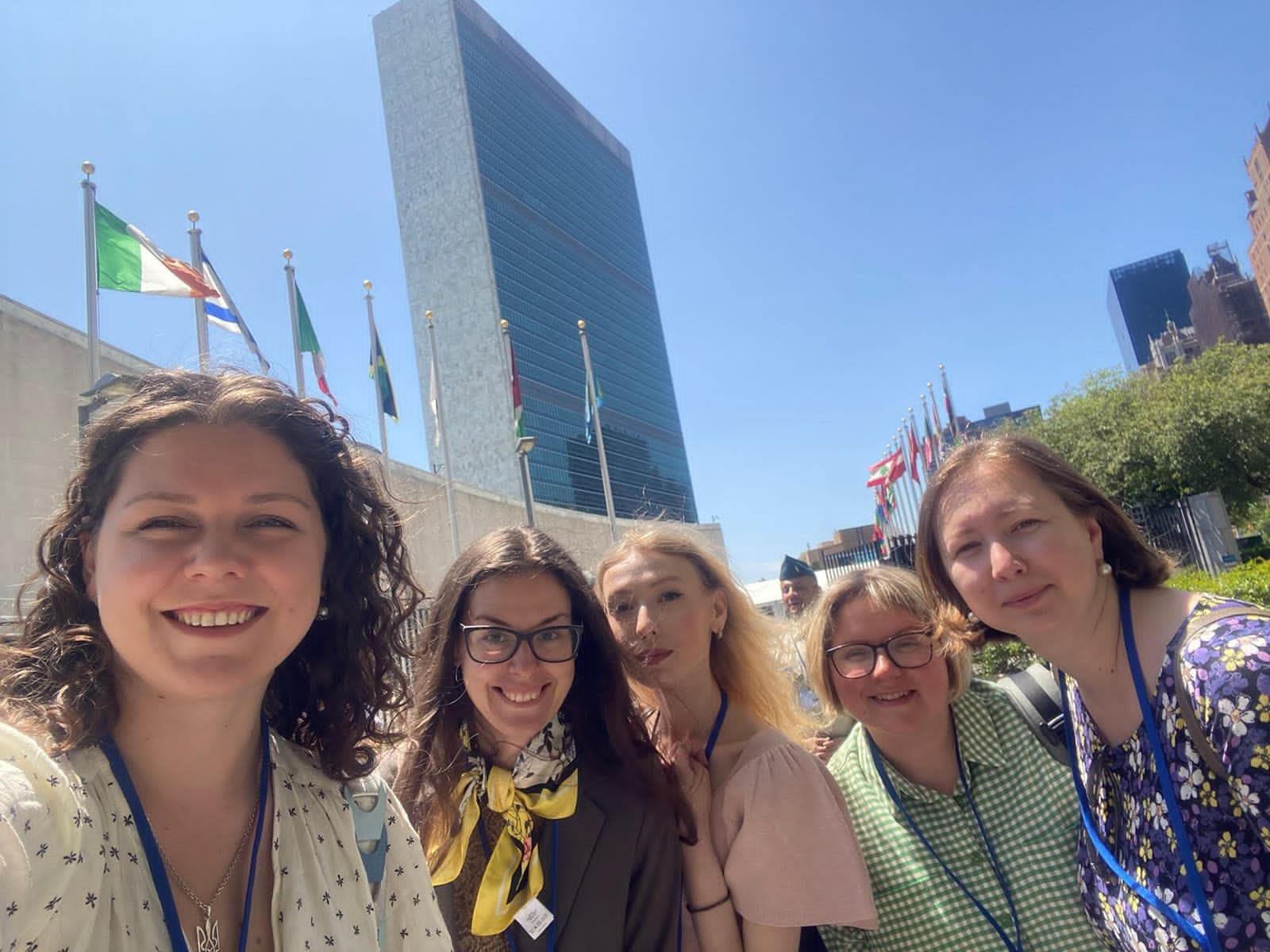
Currently, international organisations recognise that we truly have expertise in the topic, and there are qualified, caring individuals who are ready to invest their efforts and even give their lives for Ukraine to be a human rights-based society. We are being heard and listened to more – this is evident, including in the resolutions adopted by the UN that take our recommendations into account, including the recent one voted in December 2023.
It is also worth noting the development of a concept of a unified mechanism based on a UN General Assembly resolution, which provides for bilateral agreements involving a third country. This will help in the repatriation of deported Ukrainian children. We cannot yet say that it is fully operational, but we have hopes. And there is no time, because we risk simply not being able to return some children, for example, as they grow older [and are being issued Russian passports]. Especially if they are boys turning 18 who could be conscripted into the army. Like the case of Bohdan Yermokhin, who was returned some week before his 18th birthday, and he has already received a summons from the Russian military enlistment office.
Have international sanctions had an impact?
OS: In March 2014, the UN General Assembly adopted a resolution on the territorial integrity of Ukraine. So, even then, we had a decision that Crimea is Ukrainian territory and that Russia committed crimes, violated the UN Charter, but for 10 years, the execution of these decisions and the enforcement of the norms that were adopted was not achieved.
Sanctions have clearly been insufficient – as Russia was able to accumulate so many resources through the sale of oil and other energy resources, and have been producing weapons non-stop to be massively used against Ukrainians. Giving up Russian energy resources meant seriously changing one’s national system… no one wanted to take the hard way. This is at the expense of the lives of tens of thousands of [Ukrainian] civilians: women, children… they pay for insufficient sanctions.
Personal sanctions, for which human rights defenders fought, are more symbolic in nature, and they are more related to drawing attention to human rights violations. Therefore, I believe this track is important and should remain. We should not only talk about the victims but clearly identify all those responsible. That’s why we publish information about both victims and all judges, prosecutors, FSB agents whom we have clearly identified and show their connections to the persecutions they are involved in.
Russian military aggression followed by the full-scale invasion is all due to impunity, which began with Crimea and actually a lot earlier in Georgia, and Moldova… and we still don’t know where it might lead in the end.
Alena Lunova
AL: For sanctions to work, there must be serious systematic control over the implementation of sanctions and for punishing counterparts who deal with the Russian Federation through which this import bypasses sanctions. They need to understand that there will be consequences for this, and it will be economically very costly.
On the other hand, for example, the prolonged absence of Russian companies in Crimea – for example Russian banks that couldn’t operate in the peninsula for fear of losing the ability to work abroad due to sanctions – demonstrated to the local population that what happened was a violation of international law. And this perhaps not in such a painful economic sense as it was important, but a very important signal.
MS: Sanctions imposed in 2014 were effective in terms of the registration of the facts of violations. This is also important from the standpoint of the “right to truth”, because sooner or later we will have to communicate with each other – with people inside Ukraine, who have different views, some of whom already see a different picture due to massive Russian propaganda. It’s important to show how everything actually happened – that’s critically important now and will be even more important in the coming decades when people look back.
From our perspective, it is unfortunate that for 8 years sanctions were not applied to those who violated children’s rights. We advocate for the expansion of [personal sanctions], and are ready to provide information necessary for a strong evidentiary basis. We are confident that expanding sanctions pressure on mid-level actors – kids camps’ directors and leaders of movements – prompts a person to think twice, for example, before opening Young Army divisions at school or changing their health camp to a camp where children are indoctrinated and militarised. Such personal sanctions can primarily show people on the ground that their activities are violations, for which they will be held accountable.
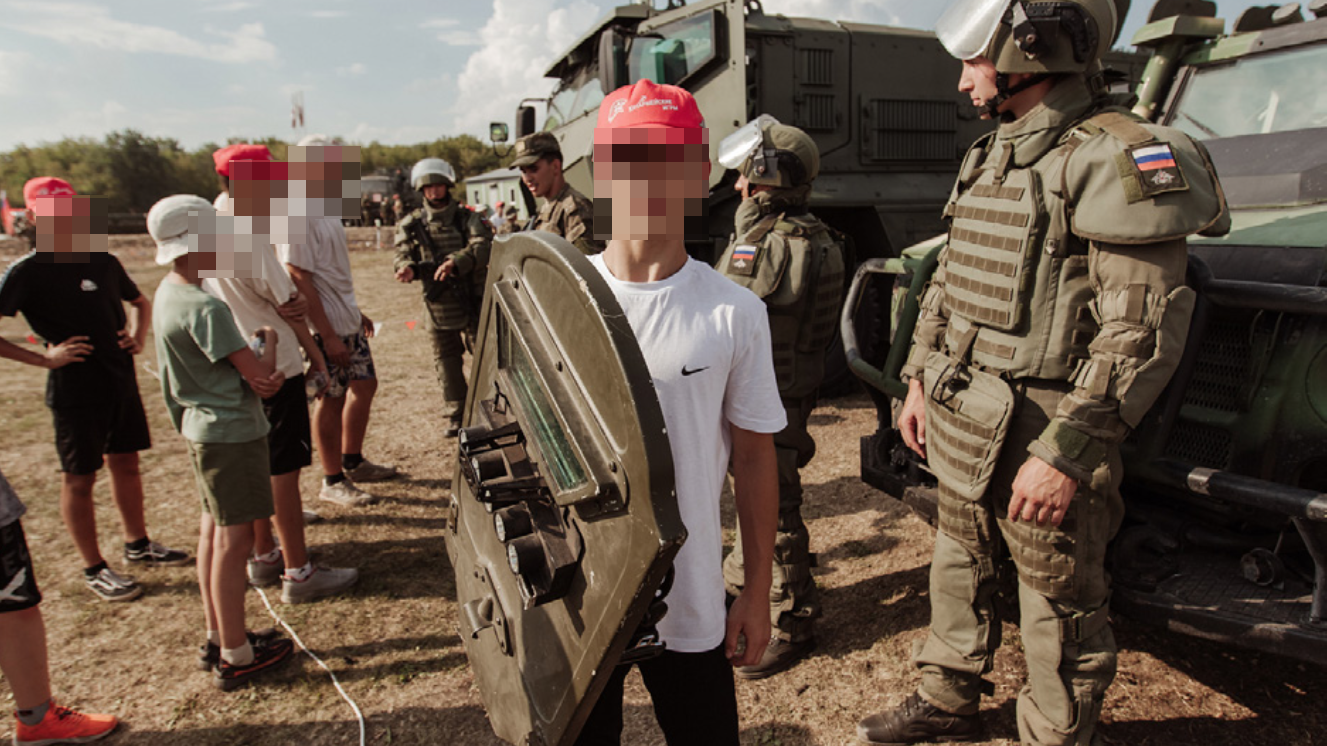
For example, the director of the Crimea Patriot Center and the organisation itself fell under the latest sanctions. What we saw after the announcement of the sanctions is that they began to publish significantly less information on their social networks and website. That is, obviously, they are monitoring this, and obviously, they understand the consequences of these sanctions.
We are also currently investigating the role of Russian universities in the deportation of children, the destruction of identity, and the militarization of children. In our opinion, if we can sanction such universities, it can also stop or at least reduce the scale of such violations. Sanctions are one of the few effective tools we can use while we do not have access to people, and to show that there will be accountability.
What strategies do you believe are most crucial for advancing human rights in Crimea? What can individuals and organisations outside of Ukraine do?
KP: Sometimes you can feel a lot of discouragement – personal, among colleagues, the international community, a feeling that nothing is working.
However, when speaking to, for example, the relatives of political prisoners, I’ve come to understand that if people engage in advocacy efforts, write letters, and remember those in Russian captivity, [political prisoners] will feel that they haven’t been forgotten.
Kateryna Petrova
Read more: Kremlin Prisoners: How to write a letter to a political prisoner
It is also important that the relatives [of political prisoners] feel it. This seems to me to already be important for those who continue to live under occupation, those who continue to resist, those who are tirelessly going to the court [hearings], visiting prisons, or not even having the opportunity to visit the prison because sometimes they don’t even know where their husband or their son or their father is. And when these people see somewhere on Facebook that we’ve organised an advocacy action and there’s a photo of their loved one on a poster, this is an extremely important support.
AL: International partners and international organisations will greatly help if they continue to keep Crimea on the agenda because it doesn’t happen on its own. I think a very promising direction would be serious academic research on Crimea, including involving international partners with the necessary capabilities. The role of Crimea is very important, especially in the global security system. I would say that research into this issue should be deepened, and more attention should be paid to security components, including food security because the issue of grain corridors is not only a matter of Ukraine’s security but also global security.
Right now, Ukraine as a state is doing its homework, which has not been done for many years in terms of preparing for de-occupation. This also requires support from international partners. For people in Crimea, they have to wait for de-occupation, and then they will be able to live in a free, unified country. Yes, with some transitional period and with certain mechanisms in place – considering issues of education, language, but these will all be workable points. What definitely must not happen is a return to the idea of territorial concessions by Ukraine – because I think anyone who tries to hand Crimea over to Russia knows very little about the significance of Crimea for Ukraine, Europe, and the Black Sea region.
And of course, support of the people living in the occupied territory is very important. Acts of solidarity drawing attention to those who have been subjected to political persecution, deprived of liberty due to politically motivated persecution, all this extra attention to people affected by the Russian Federation. Support programs, mentorship, or sometimes patronage by a well-known person over a person who has suffered due to Russian aggression and the occupation of Crimea, are also important.
OS: Following the full-scale invasion, we have expanded our documentation efforts regarding hate speech. We have been gathering evidence and working to prove specific international crimes, namely incitement to genocide, and calls for aggressive war. Because this is no longer just hate speech – this war of Russia against Ukraine is built on serious narratives and calls.
I believe that such cruel and horrific scales, as we’ve seen after the de-occupation of Bucha and Irpin, simply could not have occurred if those Russian soldiers did not have deeply ingrained attitudes towards Ukrainians, a desire to destroy, rape, and abuse our people, and this is no longer about war. It’s about the consequences of propaganda. That’s why propagandists are perpetrators, and we are [in the process of] proving the direct responsibility of those propagandists who are directly involved in inciting genocide.
[The issue of propaganda] is important not only for Ukraine but also on an international scale because the same tools that Russia uses can work in any region, wherever they are employed. Russian propagandists should be held accountable, otherwise with today’s modern technologies, you can ignite war anywhere in any country. There must be very serious accountability for crimes such as incitement to genocide or waging war.
Olha Skrypnyk
In some countries that have recently held elections, we see that pro-Russian forces are gaining ground. This speaks of a risk not only for Ukraine but for all countries. The Russian narrative is always anti-democratic, it’s always against human rights.
Even if a country thinks it is democratic and secure, it’s no longer true. Russia is at war not only with Ukraine, and its hybrid methods work in other countries, including the United States and European Union countries.
Support for Ukrainian refugees is important. It’s not even about money, it’s about support, because [Ukrainian refugees] have a difficult task – they need to remain Ukrainians and do everything to support Ukraine in its defence. At the same time, they need to integrate as much and as quickly as possible into their new communities to be able to sustain themselves. They need this help.
The aggressor cannot be involved in any negotiation processes – Ukraine’s future must be decided by Ukraine. Ukraine and its partners, who have already proven their support in practice, should shape the agenda. The involvement of the aggressor country in key processes opens the way to the repetition or preservation and conservation of aggression.
I also hope that this year will be a unifying year to build a powerful coalition that will work on the mechanism to force Russia to return civilian hostages, including those from Crimea.
What depends on the international community is to keep Crimea and Ukraine as a whole on the agenda, to keep violations in focus, and to continue diplomatic pressure. It’s important to continue moving toward justice – to hold the perpetrators accountable, and to continue discussions and preparations to the future tribunal.
Mariia Sulialina
MS: Continued support for Ukrainian civil society organisations working in the field in Ukraine is essential because it’s [Ukrainian civil society] that documents what is actually happening, and understands what the real needs of the population are.


